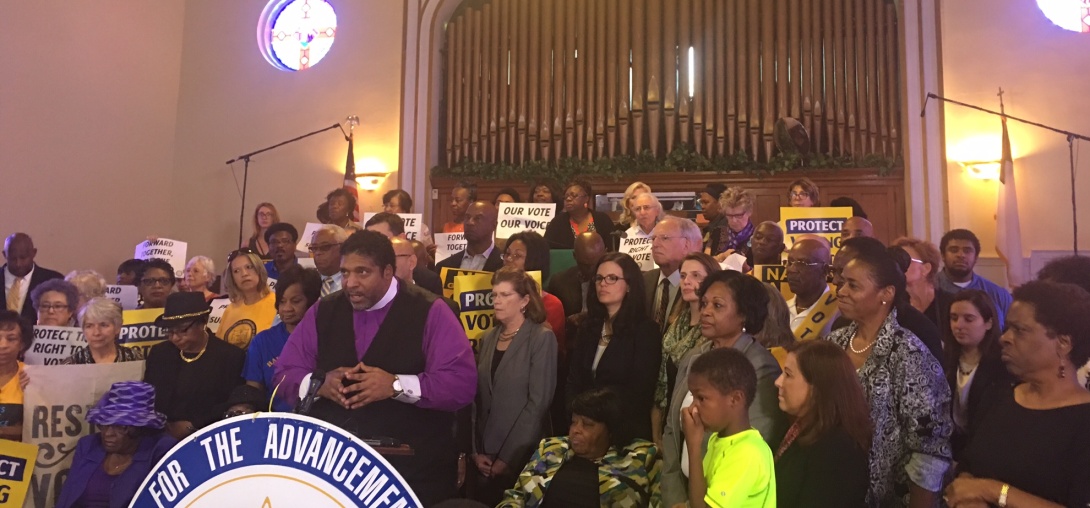VOICES: Voting rights today, voting rights tomorrow, voting rights forever!

Members of the N.C. NAACP and other opponents of the state's restrictive new election law gathered this week for a press conference following oral arguments that took place at the 4th Circuit Court of Appeals in Richmond, Virginia, in a lawsuit seeking to overturn it. (Photo by Rebekah Barber.)
The struggle for voting rights in the South has certainly been long. On June 21, 1964, three civil rights workers — James Chaney, Andrew Goodman, and Michael Schwerner — were murdered by Klansmen during Freedom Summer, an initiative to register African-American voters in Mississippi.
Exactly 52 years later, a three-judge panel of the 4th U.S. Circuit Court of Appeals in Richmond, Virginia, heard oral arguments in North Carolina NAACP v. Patrick McCrory, with lawyers for the NAACP led by Penda Hair of the Advancement Project arguing that House Bill 589, passed by North Carolina's Republican-controlled legislature in 2013, was a deliberate attempt to block growing African-American political power in the state.
Eager to hear the arguments, opponents of the bill descended upon the courthouse that once provided Confederate President Jefferson Davis with office space during the Civil War and granted him amnesty at the war's end after indicting him for treason.
Before the court was officially called to order, Rev. Dr. William J. Barber II, president of the N.C. NAACP, led the crowd in a moment of silence in honor of Chaney, Goodman, Schwerner, and all the martyrs of the civil rights movement.
Many of those who joined the North Carolina delegation were themselves active participants in the movement. When asked why she was at the courthouse, 95-year-old Rosanell Eaton, a plaintiff in the lawsuit and one of the first African Americans to register to vote in her North Carolina county back in 1942, defiantly said, "I'm fighting today because I've been fighting for 75 years."
Arguing for the state was private attorney Thomas Farr, who spent many years working under U.S. Sen. Jesse Helms, the North Carolina Republican whose 30-year term was marred by racism and prejudice. Helms, stalwart against any type of progressive legislation, vehemently opposed the 1982 renewal of the Voting Rights Act in a weeklong filibuster.
Al McSurely, a longtime civil rights attorney from North Carolina, pointed out the irony that a protégé of Helms had to present his case in front of Judge James Wynn, an African-American man from Eastern North Carolina. Back in 2014, when a 4th Circuit panel issued an injunction blocking provisions of House Bill 589, Wynn observed in his opinion that the law "disproportionately impacts African American voters."
In his arguments this week, Farr made the case that there is not enough time to reverse the lower court's decision upholding the law because the general election is so quickly approaching. Because county election officials will be trained on Aug. 8 and 9, he said, counties may not have adequate resources to accommodate changes.
Southern Coalition for Social Justice Attorney Allison Riggs, representing the League of Women Voters, disagreed. "Even one disenfranchised voter is too many," she countered. "To enfranchise voters, the training can be moved."
At a press conference following oral arguments, Barber noted that an argument similar to Farr's was made to stall integration.
Years after the Supreme Court's 1954 Brown v. Board of Education decision, many schools still had not been integrated despite the decision's order that states end segregation "with all deliberate speed." In North Carolina, it took a 1971 Supreme Court case, Swann v. Charlotte-Mecklenburg, to speed integration through forced busing.
Opponents of House Bill 589 are hopeful it will be overturned. They believe they have not only the law on their side but also history. Chaney, Goodman, Schwerner, and so many others fought to win voting rights for all, and now it is up to those of us still living to continue to come together in love and fight to protect those hard-won rights.
As Tyler Swanson, the N.C. NAACP's communication coordinator, said following the arguments, "Voting rights today, voting rights tomorrow, voting rights forever!"
(Disclosure: Rebekah Barber is the daughter of Rev. Dr. William J. Barber II.)
Tags
Rebekah Barber
Rebekah is a research associate at the Institute for Southern Studies and writer for Facing South.
